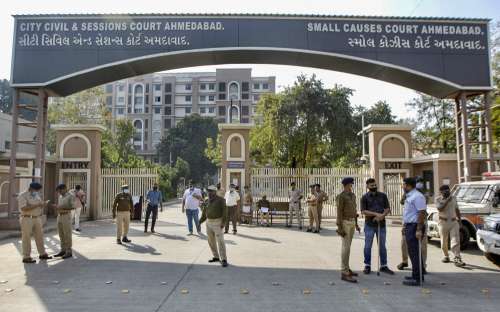The court also imposes a fine of Rs 2.85 lakh on each of the 48 convicts.
By MNS Qadri
AHMEDABAD—On Friday, a special designated court sentenced 38 of the 49 convicted to death in the 2008 Ahmedabad serial blasts case. Eleven others were sentenced to life imprisonment.
This is the highest number of convicts to be sentenced to death in a single case in India’s legal history.
The sentence for the 38 convicts was awarded under Section 302 (murder) of the Indian Penal Code and Sections 10 and 16 (1) (a) (b) of the Unlawful Activities (Prevention) Act (UAPA). A fine of Rs 25,000 was also imposed on each of the 38 for every three offences.
The court gave life sentences to 11 others under IPC Section 302 and UAPA Sections 10 and 16 (1) (a) (b). It also imposed a penalty of Rs 25,000 on each of them.
Apart from the aforementioned provisions, all 49 convicted were also sentenced to life imprisonment under four provisions of the law — UAPA Section 20, Explosive Substances Act section 3, and IPC sections 124 A (sedition), 121 A (waging war against the state).
But all the sentences shall run concurrently.
One of the convicted, Mohammad Usman Agarbattiwala, a resident of Vadodara, was the only one found guilty under the Arms Act’s Section 25(1)(B) (a). He was awarded a year of imprisonment under the said provision.
Apart from sentencing the 49 convicted persons, Special designated judge Ambalal Patel also awarded compensation to the victims from the fine amount collected from those convicted.
The court directed payment of Rs 1 lakh for the 56 victims who died, Rs 50,000 for those who suffered severe injuries, and Rs 25,000 for those who suffered minor ones.
In total, each of the 48 convicts has to pay a Rs 2.85 lakh fine. Agarbattiwala has to pay Rs 2.88 lakh.
On February 14 (2022), the prosecution concluded the arguments on the quantum of sentence for the 49 convicts.
On July 26, 2008, a total of 22 bombs rocked Ahmedabad in a span of 70 minutes. The explosions took place at
various spots, including the Civil Hospital, LG Hospital, on buses, parked bicycles, in cars, and other sites. The blasts killed 56 persons and left 200 injured. Of the 24 bombs, one each at Kalol (north of Ahmedabad) and Naroda did not go off.
On February 8, the special court had announced the conviction of 49 of the total 78 accused in the case. Another 28 were acquitted, and one accused Ayaz Saiyed turned approver in the case in 2019, supporting the prosecution’s case, and has now been pardoned and acquitted of all charges.
The court had convicted the 49 accused under various sections of the Indian Penal Code, Unlawful Activities (Prevention) Act, Explosive Substances Act, and Damage to Public Property Act. The Sections involved Sections 302 (murder), 307 (murder attempt), 121 (a) (conspiracy to wage war or attempt to wage war against the nation) and 124 (a) (sedition) and Section 16(1)(a)(b) of the UAPA about terrorist acts.
Defence lawyers said this is the highest number of convicts to be sentenced to death in a single case in India’s legal history.
The Gujarat Police had claimed that the terror attack was carried out by people associated with Indian Mujaheddin (IM), a faction of the banned Students Islamic Movement of India (SIMI). In addition, the police had claimed that the serial blasts were an act of revenge for the 2002 post-Godhra riots.
Following the serial blasts, the Indian Mujahideen had sent emails to media outlets claiming responsibility for the terror attacks.





